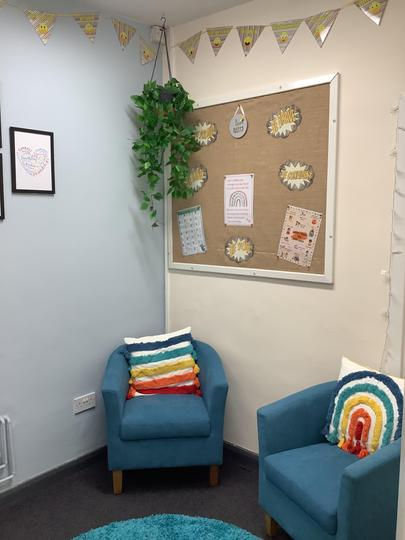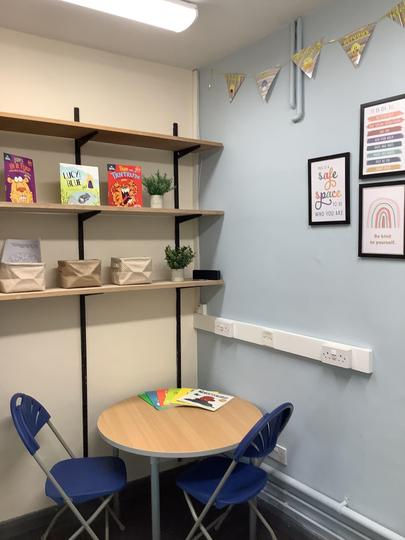
SEMH & WELLBEING
SOCIAL, EMOTIONAL, MENTAL HEALTH (SEMH) & WELLBEING
At St Mary’s we promote an inclusive, restorative environment in which each individual is valued and respected. We have an ethos of setting high expectations of attainment for all pupils with consistently applied support, tailored to each individual child where needed. We recognise that all children and young people need a solid foundation of positive mental health to benefit fully from all of the opportunities that are available to them. We want our children to be resilient and mentally healthy, so that they can succeed.
At times, anyone may need additional support to maintain or develop good mental health. The mental health of children and young people, adults in schools, parents and carers and the wider whole school community will impact on all areas of a child's development, learning, achievement and experiences. As a staff team, we understand and recognise the risk factors and indicators that may signify that a child needs additional support with their Social, Emotional & Mental Health (SEMH) needs and we respond accordingly.
We were delighted to learn in July 2024 that following accreditation, Leeds Beckett University have awarded St Mary's Catholic Primary School the Carnegie Centre of Excellence for Mental Health in Schools ‘School Mental Health Award’ – Bronze Status in partnership with North East Combined Authority.
During their time at St Mary’s, some children may experience short but significant periods of high anxiety, stress, distress or anger that affect their education, whilst some children may have a range of longer-term recognised mental health conditions. Through high quality whole-class teaching during our PSHE lessons, we provide our children with inner resources that they can draw on as a buffer when negative or stressful things happen, which helps them to thrive even in the face of significant challenges.
To support our pupils, we have created some calm, chill out zones in school where children can go to self regulate and take some time out. They can also use these spaces for any therapy or interventions.
Where a child needs targeted SEMH intervention for a mental health problem, we provide interventions that use a graduated approach to inform a clear cycle of support. These include
-
Friends Resilience
-
Time to Talk
-
Lego Therapy
-
Communicate & Regulate
We also have our own School Counsellor, who is able to support pupils on a 1-1 basis and who delivers sessions every Monday morning.
St Mary’s were also invited to take part in a long term project with the North Tyneside Connect Mental Health Support Team. They will be working with us to develop training, offer advice and support to parents and provide support to pupils in need. This work includes a trainee psychotherapist delivering CBT therapy in school to children who may need it.
At St. Mary’s, we also recognise that there can be a crossover between SEMH needs and SEND needs, to this end we always ensure that Mrs Miley the SENDCo and Mrs MacDonald the Senior Mental Health Lead meet together half termly to discuss needs across school and how best we can support pupils. Through working together and with staff and pupils, we have a graduated approach to supporting pupils.
Staff Wellbeing is a priority at St Mary's and our Wellbeing Policy ensures staff are supported through a range of strategies and initiatives in school and within our Trust.

MENTAL HEALTH & WELLBEING
At St Mary’s, we believe in promoting positive mental health and emotional wellbeing to ensure that the school is a community where everyone feels able to thrive. Our school ethos and values underpin everything that we do.
Who has mental health?
We all have mental health – some people call this emotional health or wellbeing.
What is mental health?
The World Health Organisation defines mental health as a state of wellbeing in which every individual achieves their potential, copes with the normal stresses of life, works productively and fruitfully, and is able to make a contribution to their community. Mental health includes our emotional, psychological and social wellbeing. It affects how we think, feel and act.
Good mental health and wellbeing is just as important as good physical health. Like physical health, mental health can range across a spectrum from healthy to unwell; it can fluctuate on a daily basis and change over time.
Most children grow up mentally healthy, but surveys suggest that more children and young people have problems with their mental health today than 30 years ago. It is thought that this is probably because of changes in the way that we live now and how that affects the experience of growing up.
What helps?
Things that can help keep children and young people mentally well include:
-
being in good physical health, eating a balanced diet and getting regular exercise
-
having time and the freedom to play, indoors and outdoors
-
being part of a family that gets along well most of the time
-
going to a school that looks after the wellbeing of all its pupils
-
taking part in local activities for young people.
Other factors are also important, including:
-
feeling loved, trusted, understood, valued and safe
-
being interested in life and having opportunities to enjoy themselves
-
being hopeful and optimistic
-
being able to learn and having opportunities to succeed
-
accepting who they are and recognising what they are good at
-
having a sense of belonging in their family, school and community
-
feeling they have some control over their own life
-
having the strength to cope when something is wrong (resilience) and the ability to solve problems.
What happens in school?
In school, we teach children about what it means to have good mental health and wellbeing throughout our curriculum and daily practice.
Our PSHE and RSE curriculum focuses specifically on developing children’s social and emotional skills which can prevent poor mental health from developing and help all children cope effectively with setbacks and remain healthy. It is about helping children to understand and manage their thoughts, feelings and behaviour and build skills that help them to thrive, such as working in a team, persistence, and self-awareness.
The development of our school mental health offer has been a team effort with pupils, staff and parents along with the Connect Mental Health Team and Darrin our school Counsellor working under the guidance of Mrs MacDonald our School Mental Health Lead. We are delighted to learn from Leeds Beckett University that following accreditation, St Mary's Catholic Primary School has been awarded the Carnegie Centre of Excellence for Mental Health in Schools ‘School Mental Health Award’ – Bronze Status in partnership with NorthEast Combined Authority. - We are very proud to hold this award.
Mental Health First Aid
Mental Health First Aid is designed to help people understand what mental health is. The training is designed to identify what mental health is, how to look after your own and other's wellbeing, how to spot signs of poor mental health and where to signpost those who need it to the correct support networks.
At St Mary's we have 2 trained Mental Health First Aiders in Mrs Cutting and Mrs MacDonald. We have also trained 7 other members of staff in Mental Health Awareness and regularly update all staff on mental health and wellbeing during staff meetings and INSET days.
Connect Mental Health Support Team
We are currently involved with the Connect MHST in North Tyneside. They support the staff in school to identify pupils and families with a range of mental health related issues including anxiety, sleep concerns, eating problems, worries etc. They can provide a range of early interventions including CBT, parent-led CBT as well as focused groups such as Friends Resilience. They are also able to signpost staff, parents and pupils to other support services in our locality.

What if my child is experiencing difficulties with their mental health and wellbeing?
Mental health doesn’t mean being happy all the time and neither does it mean avoiding stresses altogether. One of the most important ways to help your child is to listen to them and take their feelings seriously.
In many instances, children and young people’s negative feelings and worries usually pass with the support of their parents and families. It is helpful for the school to know what they are going through at these times, so that staff can be aware of the need and support this.
Coping and adjusting to setbacks are critical life skills for children, just as they are for adults, but it is important that they develop positive, rather than negative, coping skills.
If you are ever worried about your child’s mental health and wellbeing then, just as you would about any concerns that you have about their learning, come and talk to us. Sometimes children will need additional support for a short period – this may be in the form of a daily check-in with a trusted adult, time to talk through what they are feeling and support in developing ways of moving forwards with this.
If your child is distressed for a long time, if their negative feelings are stopping them from getting on with their lives, if their distress is disrupting family life or if they are repeatedly behaving in ways you would not expect at their age, then please speak to your child's teacher.
Looking after yourself
If things are getting you down, it’s important to recognise this. Talk to someone you trust and see what they think. It is easy to go on struggling with very difficult situations because you feel that you should be able to cope and don’t deserve any help.
Come and talk to us, in confidence and let us know when things are tough. As much as you try to hide how you are feeling from your child, they will notice even the smallest changes.
Go to your GP if things are really getting on top of you. Asking for some support from your doctor or a referral to a counselling service is a sign of strength. You can’t help your child if you are not being supported yourself. Whatever you're going through you can call the Samaritans 24 hours a day, 365 days a year. Call 116 123 for free
Below are links to a number of websites and resources which can support you and your child's mental health and wellbeing
Sometimes children worry about their parents or family members and might need someone to talk to. They can talk to Childline online or by calling 0800 1111 at any time 24/7





